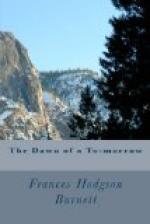Inside the shop more dangling spectres hung and the place was almost dark. It was a shabby pawnshop, and the man lounging behind the counter was a shabby man with an unshaven, unamiable face.
“I want to look at that pistol in the right-hand corner of your window,” Antony Dart said.
The pawnbroker uttered a sound something between a half-laugh and a grunt. He took the weapon from the window.
Antony Dart examined it critically. He must make quite sure of it. He made no further remark. He felt he had done with speech.
Being told the price asked for the purchase, he drew out his purse and took the money from it. After making the payment he noted that he still possessed a five-pound note and some sovereigns. There passed through his mind a wonder as to who would spend it. The most decent thing, perhaps, would be to give it away. If it was in his room—to-morrow— the parish would not bury him, and it would be safer that the parish should.
He was thinking of this as he left the shop and began to cross the street. Because his mind was wandering he was less watchful. Suddenly a rubber-tired hansom, moving without sound, appeared immediately in his path—the horse’s head loomed up above his own. He made the inevitable involuntary whirl aside to move out of the way, the hansom passed, and turning again, he went on. His movement had been too swift to allow of his realizing the direction in which his turn had been made. He was wholly unaware that when he crossed the street he crossed backward instead of forward. He turned a corner literally feeling his way, went on, turned another, and after walking the length of the street, suddenly understood that he was in a strange place and had lost his bearings.
This was exactly what had happened to people on the day of the memorable fog of three years before. He had heard them talking of such experiences, and of the curious and baffling sensations they gave rise to in the brain. Now he understood them. He could not be far from his lodgings, but he felt like a man who was blind, and who had been turned out of the path he knew. He had not the resource of the people whose stories he had heard. He would not stop and address anyone. There could be no certainty as to whom he might find himself speaking to. He would speak to no one. He would wander about until he came upon some clew. Even if he came upon none, the fog would surely lift a little and become a trifle less dense in course of time. He drew up the collar of his overcoat, pulled his hat down over his eyes and went on—his hand on the thing he had thrust into a pocket.
He did not find his clew as he had hoped, and instead of lifting the fog grew heavier. He found himself at last no longer striving for any end, but rambling along mechanically, feeling like a man in a dream—a nightmare. Once he recognized a weird suggestion in the mystery about him. To-morrow might one be wandering about aimlessly in some such haze. He hoped not.




